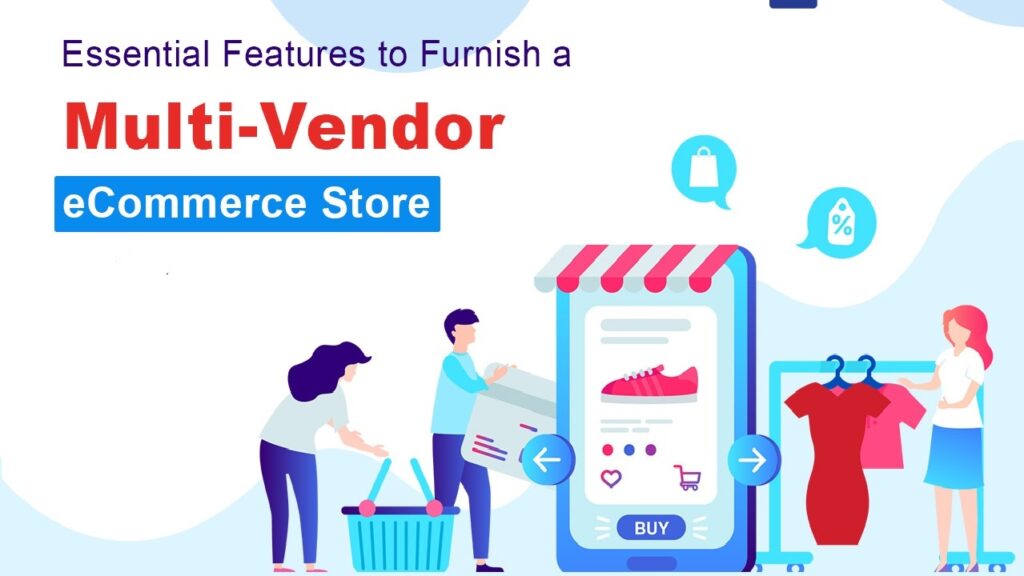What is Multi-vendor Ecommerce Marketplace ?
Multi-vendor e-commerce is a type of online marketplace where multiple sellers can offer their products or services to customers through a single platform. In this model, the platform owner acts as a facilitator, providing the technology infrastructure and tools for vendors to list their products, manage their inventory, process payments, and fulfill orders. Customers can browse and purchase products from different vendors within the same website, often with features such as product comparison and ratings and reviews. Multi-vendor e-commerce platforms have become increasingly popular in recent years, as they allow small and medium-sized businesses to reach a wider audience without the need for a dedicated online store. They also provide customers with a wider range of products and prices to choose from, creating a more competitive and dynamic marketplace.

Common features of Multi-vendor e-commerce:
- Vendor management tools: Multi-vendor ecommerce platforms provide a range of tools to help vendors manage their listings, inventory, orders, and payments. This includes features such as product listing, order management, shipping and fulfillment, and payment processing.
- Customer experience: Multi-vendor ecommerce platforms provide features that enhance the customer experience such as search and filtering, ratings and reviews, product comparison, and personalized recommendations.
- Revenue models: Multi-vendor ecommerce platforms typically offer a range of revenue models such as commission-based, subscription-based, or listing fees. These models allow the platform owner to generate revenue while providing vendors with an affordable way to reach a wider audience.
- Platform security: Multi-vendor ecommerce platforms must prioritize the security of transactions and user data. They provide tools and features for protecting customer and vendor data, such as encryption, fraud detection, and secure payment processing.
- Marketing and promotion: Multi-vendor ecommerce platforms rely on effective marketing and promotion to attract vendors and customers. They may offer tools and features for social media marketing, email marketing, and search engine optimization (SEO).
- Customization and flexibility: Multi-vendor ecommerce platforms offer customization options to vendors and often allow them to choose their own shipping and payment methods. This provides vendors with more flexibility and allows them to tailor their listings to their own brand.
- Scalability: Multi-vendor ecommerce platforms must be able to scale to accommodate growing numbers of vendors and customers. This requires a robust infrastructure and architecture that can handle high traffic and processing demands.
- User-friendly interface: Multi-vendor ecommerce platforms aim to provide a user-friendly interface that is easy to navigate and intuitive to use for both vendors and customers. This includes features such as simple product listing forms, clear call-to-actions, and easy checkout processes.
- Analytics and reporting: Multi-vendor ecommerce platforms offer analytics and reporting tools that help vendors track their sales, performance, and customer behavior. This helps vendors to make data-driven decisions and improve their sales and marketing strategies.
- Customer support: Multi-vendor ecommerce platforms provide customer support for both vendors and customers. This includes channels such as email, live chat, and phone support, as well as knowledge bases and FAQs.
- Integrations: Multi-vendor ecommerce platforms often integrate with other tools and services such as shipping carriers, payment gateways, and marketing automation platforms. These integrations provide additional functionality and streamline processes for vendors and customers.
- Social media integration: Multi-vendor ecommerce platforms often offer social media integration, allowing vendors to promote their products on social media and customers to share their purchases on social media. This provides additional exposure for vendors and helps to build brand awareness for the platform.
- SEO optimization: Multi-vendor ecommerce platforms aim to be SEO-friendly, with features such as customizable meta tags, optimized URLs, and keyword research tools. This helps to improve the platform’s visibility and attract more traffic from search engines.

Benefits of Multivendor Ecommerce website:
Multi-vendor ecommerce websites offer several benefits to both vendors and customers. Here are some of the key benefits:
- Increased sales opportunities: Multi-vendor ecommerce websites provide vendors with access to a larger customer base, resulting in increased sales opportunities. This is particularly beneficial for small businesses that may not have the resources to invest in their own ecommerce website.
- Reduced costs: Multi-vendor ecommerce websites allow vendors to reduce their operating costs by sharing the costs of website development, maintenance, and marketing. This makes it more affordable for vendors to sell their products online and compete with larger businesses.
- Competitive pricing: Multi-vendor ecommerce websites encourage price competition between vendors, resulting in lower prices for customers. Customers can compare prices and product features across different vendors, resulting in a more transparent and competitive marketplace.
- Improved customer experience: Multi-vendor ecommerce websites offer customers a wider range of products to choose from, with the ability to compare prices, read reviews, and purchase from multiple vendors within the same platform. This provides customers with a more convenient and streamlined shopping experience.
- Reduced time to market: Multi-vendor ecommerce websites allow vendors to quickly list their products and start selling online, reducing the time it takes to bring products to market. This is particularly beneficial for businesses with seasonal or limited-time products.
- Scalability: Multi-vendor ecommerce websites are designed to be scalable, allowing them to accommodate growing numbers of vendors and customers. This means that businesses can easily expand their product offerings and customer base without having to invest in additional infrastructure.
- Revenue generation: Multi-vendor e-commerce websites generate revenue through various revenue models, such as commission-based, subscription-based, or listing fees. This provides the platform owner with a sustainable source of revenue while providing vendors with an affordable way to reach a wider audience.
Overall, multi-vendor e-commerce websites provide a range of benefits to both vendors and customers, resulting in a more competitive and dynamic online marketplace.

